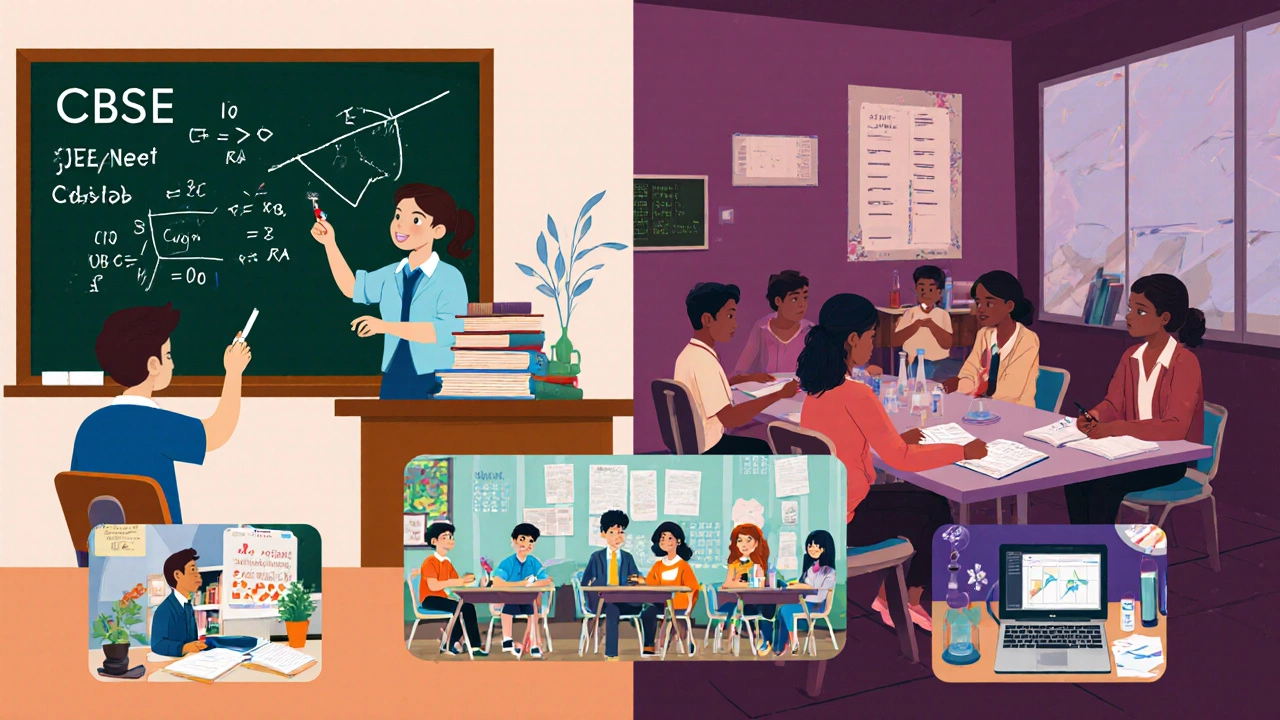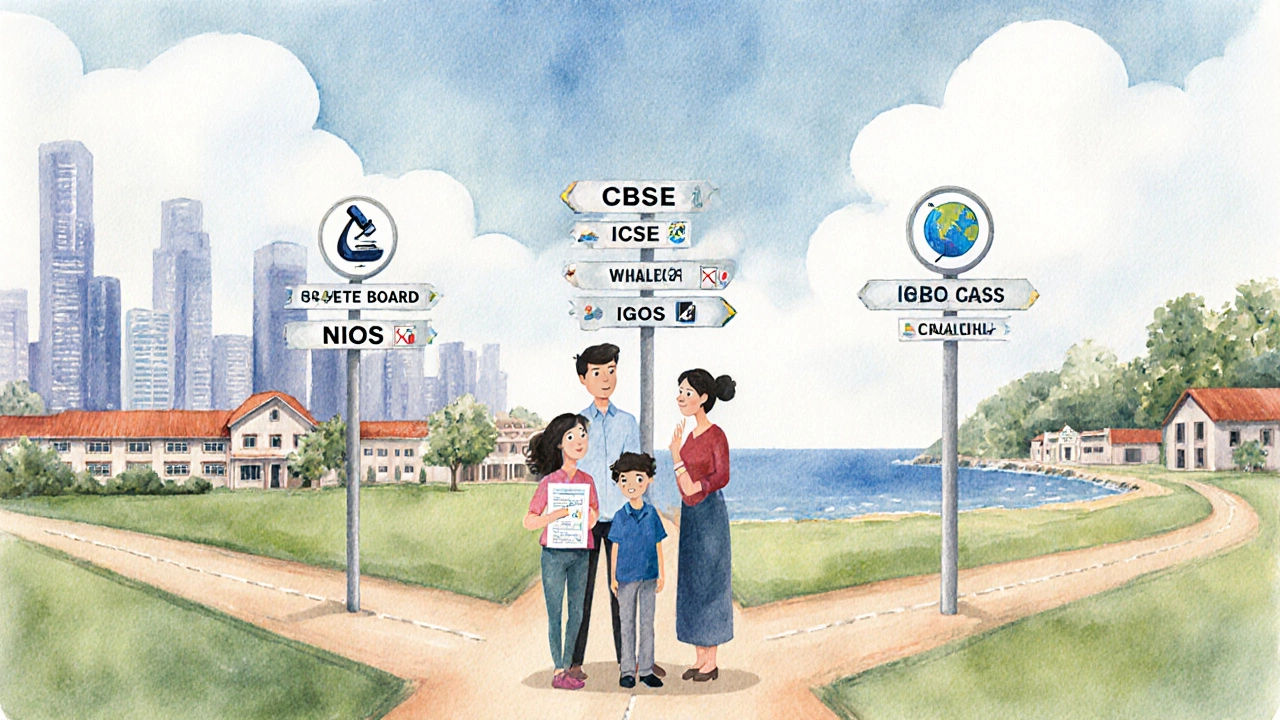When parents and students ask "Which board has the highest value in India?", they’re really looking for the board that opens the most doors - whether it’s a top university, a competitive exam, or a solid career start. The answer isn’t a single name that fits every situation, but a clear picture of how each board stacks up against the criteria that matter most today.
Key Takeaways
- CBSE leads on national exam preparation and college acceptance across India.
- ICSE offers deeper academic rigor, ideal for students aiming for elite universities abroad.
- State boards excel in regional language support and lower fees but vary widely in curriculum strength.
- NIOS provides flexible learning for non‑traditional students.
- International boards like IB and IGCSE give global recognition but come with higher costs.
What Does "Value" Actually Mean?
Value can be broken down into five measurable factors:
- Recognition by universities and employers
- Alignment with national competitive exams (JEE, NEET, UPSC)
- Curriculum depth and skill development
- Cost and accessibility
- Flexibility for diverse learning needs
By scoring each board on these dimensions, we can see which one truly delivers the highest overall value.
Major Education Boards in India
Below is a quick snapshot of the most common boards you’ll encounter.
CBSE is a central government‑run board that focuses on a uniform curriculum across the country, strong emphasis on science and mathematics, and direct alignment with national competitive exams like JEE and NEET.
ICSE is a private board run by the Council for the Indian School Certificate, known for its comprehensive syllabus, extensive language options, and preparation for higher‑order thinking skills.
Maharashtra State Board (often called MSBSHSE) is the state‑run board for Maharashtra, delivering curriculum in Marathi and English, with a focus on regional relevance and affordable fees.
Tamil Nadu State Board is the state education authority for Tamil Nadu, offering a curriculum in Tamil and English, known for high literacy outcomes and state‑specific scholarship schemes.
NIOS (National Institute of Open Schooling) is an open‑learning board that provides flexible timing, remote exams, and pathways for students who cannot attend regular schools.
IB (International Baccalaureate) is a globally recognised programme delivering a rigorous, inquiry‑based curriculum that prepares learners for universities worldwide.
IGCSE (International General Certificate of Secondary Education) is a Cambridge‑offered qualification that emphasizes practical knowledge and is accepted by many overseas institutions.
Side‑by‑Side Comparison
| Board | University Recognition | Competitive Exam Alignment | Curriculum Depth | Cost (annual) | Flexibility |
|---|---|---|---|---|---|
| CBSE | High (All Indian universities, many abroad) | Excellent (JEE, NEET, AIIMS) | Moderate‑High | ₹8,000‑₹15,000 | Standard (regular school days) |
| ICSE | High (Selective Indian colleges, good abroad) | Good (requires extra coaching for JEE/NEET) | Very High (literature, science, maths) | ₹12,000‑₹20,000 | Standard |
| Maharashtra State Board | Medium (State universities, some national) | Fair (state‑level exams, less JEE focus) | Medium | ₹5,000‑₹10,000 | Standard |
| Tamil Nadu State Board | Medium (State and central universities) | Fair (state‑level entrance, supplementary JEE prep needed) | Medium‑High | ₹5,000‑₹12,000 | Standard |
| NIOS | Medium‑High (recognised by most universities) | Good (students can sit for JEE/NEET as private candidates) | Variable (depends on chosen subjects) | ₹3,000‑₹8,000 | High (self‑paced, remote exams) |
| IB | Very High (global top universities) | Fair (needs extra tutoring for Indian exams) | Very High (critical thinking, research) | ₹2,00,000‑₹3,50,000 | Medium (rigorous schedule) |
| IGCSE | High (widely accepted overseas) | Fair (requires extra coaching for Indian competitive exams) | High | ₹1,00,000‑₹2,00,000 | Medium‑High (exam windows worldwide) |

Which Board Scores the Highest?
Looking at the table, CBSE emerges as the board that delivers the highest overall value for the typical Indian student aiming for national universities and competitive exams. Its curriculum is deliberately streamlined to mirror the syllabi of JEE and NEET, which translates into better scores with less extra coaching. ICSE follows closely for families that prize academic depth and plan for overseas higher education. International boards (IB, IGCSE) rank high on global recognition but trail in cost‑effectiveness for Indian contexts.
How to Pick the Right Board for Your Child
- Goal‑oriented thinking: If your child’s dream is an engineering or medical seat, CBSE’s alignment with JEE/NEET gives a clear edge.
- Academic thirst: For students who love literature, philosophy, and research, ICSE’s broader subject pool can keep curiosity alive.
- Budget constraints: State boards and NIOS provide quality education at a fraction of the cost, making them ideal for price‑sensitive families.
- Geographic flexibility: NIOS and International boards suit nomadic families or those living abroad.
- Language preference: State boards teach in regional languages; CBSE and ICSE use English as the primary medium.
Take a checklist, rank your priorities, and match them against the board profiles above. The “best” board is the one that fits your child’s aspirations, learning style, and family circumstances.
Common Pitfalls and Pro Tips
Don’t chase prestige alone. A high‑profile board won’t guarantee success if the school’s teaching quality is poor. Always inspect the school’s faculty credentials and past results.
Beware of extra‑coach dependency. Boards like CBSE reduce the need for costly tuition, but many parents still enroll their kids in coaching centres. Evaluate whether the board’s curriculum already covers the exam pattern before adding extra layers.
Plan for transitions. If you anticipate moving states or abroad, consider a board with smoother transferability (CBSE, ICSE, IB). This avoids losing credits or repeating a year.

Quick Decision Tree
- Is national competitive exam success the top priority? → Choose **CBSE**.
- Do you want deeper academic content and possible overseas study? → Choose **ICSE** or **IB**.
- Is cost the main concern and you’re comfortable with regional language? → Choose your state board (e.g., Maharashtra, TamilNadu).
- Do you need a flexible schedule or are you studying from home? → Choose **NIOS**.
- Do you aim for top global universities and can afford higher fees? → Choose **IB** or **IGCSE**.
Frequently Asked Questions
Which board gives the best preparation for JEE?
CBSE is designed to align closely with the JEE syllabus, so students often need less additional coaching compared to other boards.
Is ICSE better than CBSE for overseas university admission?
ICSE’s rigorous curriculum and strong emphasis on English give it an edge for many foreign universities, though IB remains the top global choice.
Can I switch from a state board to CBSE after Class 8?
Yes, many schools accept transfers, but you’ll need to bridge any curriculum gaps, especially in science and mathematics.
What are the main benefits of NIOS?
NIOS offers flexible timing, the ability to study from anywhere, and the chance to sit for board exams as a private candidate, making it ideal for athletes, artists, or working students.
Is the IB program worth the high fee in India?
If your goal is admission to top‑tier global universities and you can afford the fee, IB’s holistic assessment and critical‑thinking focus can give a strong advantage. For most Indian college routes, CBSE or ICSE is more cost‑effective.
Next Steps
1. List your family’s priorities (exam goals, budget, language, mobility).
2. Use the comparison table to shortlist 2‑3 boards that meet those priorities.
3. Research schools under those boards in your locality - check infrastructure, teacher qualifications, and past results.
4. Talk to current parents and students for real‑world feedback.
5. Make a decision before the admission window closes, usually 3‑4 months before the new academic year.
Remember, the board you pick is a strong foundation, but the real value comes from how you and your child engage with the learning process.

